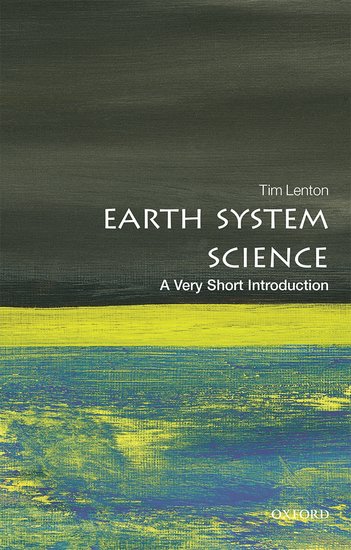Home >
A Very Short Introduction >
Earth System Science (Science)
A Very Short Introduction | Science
Earth System Science
ISBN: 9780198718871
Series: A Very Short Introduction
Earth System Science (Science)
A Very Short Introduction Earth System Science (Science) Media > Books > Non-Fiction > Education Books Expect Delays of Up to 4 Weeks| Order Below |
ISBN
9780198718871 (10-digit ISBN: 019871887X)
- Description
- Key Features
- Series Description
- Table of Contents
- Introduces Earth System Science as an important and growing interdisciplinary area of research
- Traces how Earth System Science has emerged as a field in its own right since the 1960s alongside concerns about global change
- Outlines the tipping points that are currently recognised in the Earth system
- Places the Earth system in wider context, including the latest insights into other habitable planets
- Explains how understanding the fragility of the Earth system and its past history can help humanity achieve sustainability
When humanity first glimpsed planet Earth from space, the unity of the system that supports humankind entered the popular consciousness. The concept of the Earth's atmosphere, biosphere, oceans, soil, and rocks operating as a closely interacting system has rapidly gained ground in science. This new field, involving geographers, geologists, biologists, oceanographers, and atmospheric physicists, is known as Earth System Science.
In this Very Short Introduction, Tim Lenton considers how a world in which humans could evolve was created; how, as a species, we are now reshaping that world; and what a sustainable future for humanity within the Earth System might look like. Drawing on elements of geology, biology, chemistry, physics, and mathematics, Lenton asks whether Earth System Science can help guide us onto a sustainable course before we alter the Earth system to the point where we destroy ourselves and our current civilisation.
Oxford's Very Short Introductions series offers concise and original introductions to a wide range of subjects--from Islam to Sociology, Politics to Classics, Literary Theory to History, and Archaeology to the Bible.
Not simply a textbook of definitions, each volume in this series provides trenchant and provocative--yet always balanced and complete--discussions of the central issues in a given discipline or field. Every Very Short Introduction gives a readable evolution of the subject in question, demonstrating how the subject has developed and how it has influenced society. Eventually, the series will encompass every major academic discipline, offering all students an accessible and abundant reference library.
Whatever the area of study that one deems important or appealing, whatever the topic that fascinates the general reader, the Very Short Introductions series has a handy and affordable guide that will likely prove indispensable.
Please note: As this series is not ELT material, these titles are not subject to discount.
1: Home
2: Recycling
3: Regulation
4: Revolutions
5: Anthropocene
6: Projection
7: Sustainability
8: Generalisation
References
Index
When humanity first glimpsed planet Earth from space, the unity of the system that supports humankind entered the popular consciousness. The concept of the Earth's atmosphere, biosphere, oceans, soil, and rocks operating as a closely interacting system has rapidly gained ground in science. This new field, involving geographers, geologists, biologists, oceanographers, and atmospheric physicists, is known as Earth System Science.
In this Very Short Introduction, Tim Lenton considers how a world in which humans could evolve was created; how, as a species, we are now reshaping that world; and what a sustainable future for humanity within the Earth System might look like. Drawing on elements of geology, biology, chemistry, physics, and mathematics, Lenton asks whether Earth System Science can help guide us onto a sustainable course before we alter the Earth system to the point where we destroy ourselves and our current civilisation.
Key Features
- Introduces Earth System Science as an important and growing interdisciplinary area of research
- Traces how Earth System Science has emerged as a field in its own right since the 1960s alongside concerns about global change
- Outlines the tipping points that are currently recognised in the Earth system
- Places the Earth system in wider context, including the latest insights into other habitable planets
- Explains how understanding the fragility of the Earth system and its past history can help humanity achieve sustainability
Series Description
Oxford's Very Short Introductions series offers concise and original introductions to a wide range of subjects--from Islam to Sociology, Politics to Classics, Literary Theory to History, and Archaeology to the Bible.
Not simply a textbook of definitions, each volume in this series provides trenchant and provocative--yet always balanced and complete--discussions of the central issues in a given discipline or field. Every Very Short Introduction gives a readable evolution of the subject in question, demonstrating how the subject has developed and how it has influenced society. Eventually, the series will encompass every major academic discipline, offering all students an accessible and abundant reference library.
Whatever the area of study that one deems important or appealing, whatever the topic that fascinates the general reader, the Very Short Introductions series has a handy and affordable guide that will likely prove indispensable.
Please note: As this series is not ELT material, these titles are not subject to discount.
EASY ORDER FORM
PRICES LISTED INCLUDE CONSUMPTION TAX
Price Before Tax:
¥1,790


